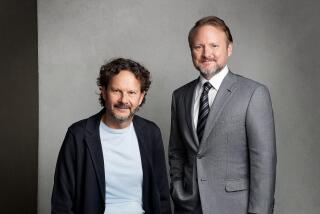Timothy Spall keeps history alive once again as a Holocaust denier in ‘Denial’

- Share via
When Timothy Spall was offered the role of infamous Holocaust denier David Irving in Mick Jackson’s “Denial,” he recognized that it was a unique opportunity, but might not be the right one for him at that time. The Cannes best actor winner had just finished playing another controversial real-life character, Northern Ireland politician Ian Paisley, in Nick Hamm’s “The Journey.” He wasn’t sure he wanted to play yet another historical figure who was “loathed by a lot of people.”
Still, Spall notes, “any role I play whether they hold controversial views, whether they are a popular character, whether they are a person completely insignificant as far as history is concerned, I always do it exactly the same. I try to play them completely from their own point of view.”
Based on Deborah Lipstadt’s autobiographical book “History on Trial: My Day in Court with a Holocaust Denier,” the movie chronicles the author’s legal battle with Irving, a British historian and author who accused her of libel for describing him as a Holocaust denier in a 1993 book. David Hare’s screenplay is specifically from Lipstadt’s perspective (she’s played by Rachel Weisz in the film), and that didn’t leave a lot of room for Irving’s character to be completely fleshed out.
“I discussed it with Mick a couple of times before I said yes,” Spall says. “I just wanted him to know that I, as an actor, am very interested in playing as many levels as I can in a character as opposed to just showing up to play the ‘baddie.’ And he said, ‘No. We’ll accentuate as much as we can.’ There is only the one scene with his child and there are a couple of references Andrew Scott’s character makes when he meets Lipstadt in America about what [Irving’s] motivations are about his past. About his father abandoning him and so forth. I decided that I would have to swallow that’s not in the case.”
Spall says he focused on giving his version of Irving a slightly unexpected subtext. He notes, “It was very much to feel that even in these strident views there are flashes of self-doubt. Some might say an ‘unearned vulnerability,’ but that was my job. It’s not to try and turn the tables but find something in it.”
No stranger to playing famous faces, Spall says that he has a “responsibility to see what they look like and see how they are,” by researching as much as possible before portraying them.
“Sometimes I look at photographs and I look at them like that for a long time and just think about that,” Spall says. “And I cover one side of the face and look at one eye and cover the other side of their face and look at the other eye. Then I just try and make this sort of leap of imagination and see if I can understand them in a feeling in myself.”
For Irving in particular, Spall reviewed a number of his speeches that became a great source of reference. Especially ones where he was more relaxed off the speaker’s podium. And that was absolutely necessary since it was highly unlikely the real-life Irving was ever going to participate in the production.
“There was one [speech] where he was talking about being at school and about how people used to disagree with him and didn’t like the way he dressed and how he wasn’t going to take any notice of what people felt of him. If he wanted to be dressed that way, he would,” Spall recalls. “There were certain vulnerabilities in that that I took from. There were certain pointers in it that made me understand the connection I was trying to make beyond just what he was saying.”
Even though “Denial” filmed at the height of the U.S. presidential primary season, Spall says he didn’t really see how contextually relevant it was at the time. By the time it hit theaters, critics and audiences were absolutely seeing the parallels between his character and the Republican presidential nominee.
“I presume when somebody thinks they are right, they think they are right,” Spall says. “And there are people, no matter how controversial their views are, there is a little bit going on now, yeah? They refuse to accept that they are wrong.”
See the most read stories this hour »
More to Read
Sign up for The Envelope
Get exclusive awards season news, in-depth interviews and columnist Glenn Whipp’s must-read analysis straight to your inbox.
You may occasionally receive promotional content from the Los Angeles Times.







